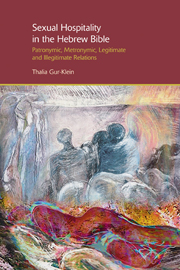 Sexual Hospitality in the Hebrew Bible
Sexual Hospitality in the Hebrew Bible Evoking Hamilton, mentioned above, we recall that a symbolic code precipitates relations between functional behaviour and a signifying system of concepts and customs. Inhering in signifying patterns of behaviour, symbolic codes conceive of signs and functional rules that mutually generate one another (Hamilton 2005: 16). By inference, encoded systems generate rules and postulate recognizable signs; with such symbolic systems we can deduce behaviour according to preconceived rules and customs. Precipitating preconceived relations between designated roles, these rules reflect coherent relationships between a custom and signs which generate the concomitant signifying performativity and behaviour. Rules therefore are functional, decoding relations between a custom and a pattern of behaviour that people adapt.
The Myth and Ritual School lays out the idea of patternism, which predates the more recent approaches. Avoiding a discussion on the disagreement and contention among scholars, patternism refers to pattern as ‘a fixed combination of certain elements which are expected to recur and which, consequently, postulate even when they have left no trace in our evidence’ (H. Frankfurt, cited in Hooke 1958: 5). Hooke postulates that the borrowing of patterns among cultures exists side by side with independent development of ideas and institutions (Hooke 1933a: 6). Endorsing such assumptions, we may conclude that similarities of patterns are contingent, comparable and deducible, while differences are evolutionary, indigent and locally and personally particular.
To save this book to your Kindle, first ensure [email protected] is added to your Approved Personal Document E-mail List under your Personal Document Settings on the Manage Your Content and Devices page of your Amazon account. Then enter the ‘name’ part of your Kindle email address below. Find out more about saving to your Kindle.
Note you can select to save to either the @free.kindle.com or @kindle.com variations. ‘@free.kindle.com’ emails are free but can only be saved to your device when it is connected to wi-fi. ‘@kindle.com’ emails can be delivered even when you are not connected to wi-fi, but note that service fees apply.
Find out more about the Kindle Personal Document Service.
To save content items to your account, please confirm that you agree to abide by our usage policies. If this is the first time you use this feature, you will be asked to authorise Cambridge Core to connect with your account. Find out more about saving content to Dropbox.
To save content items to your account, please confirm that you agree to abide by our usage policies. If this is the first time you use this feature, you will be asked to authorise Cambridge Core to connect with your account. Find out more about saving content to Google Drive.